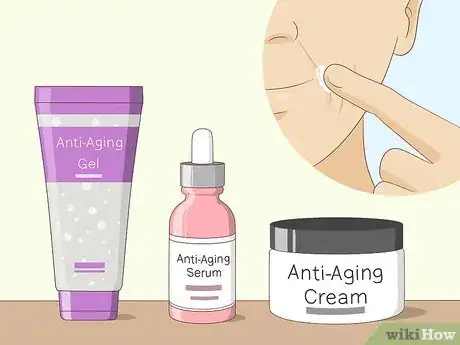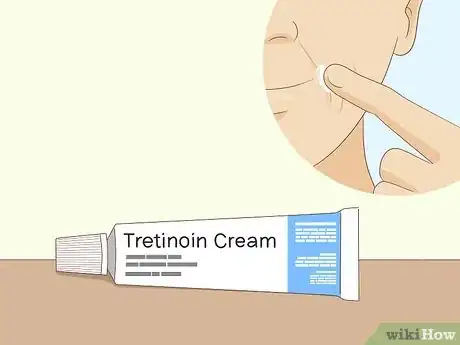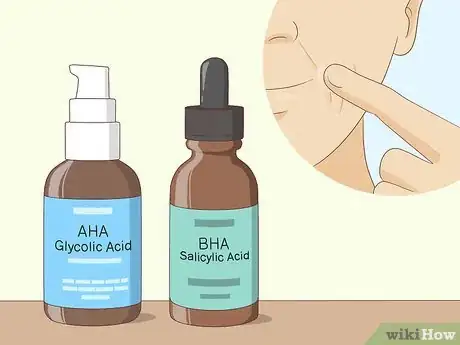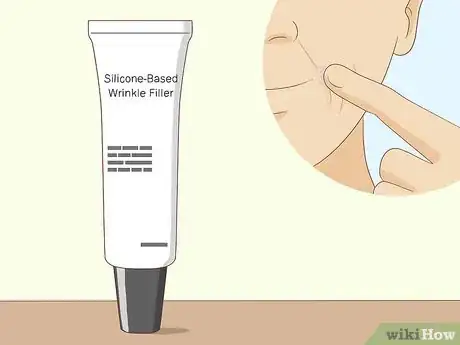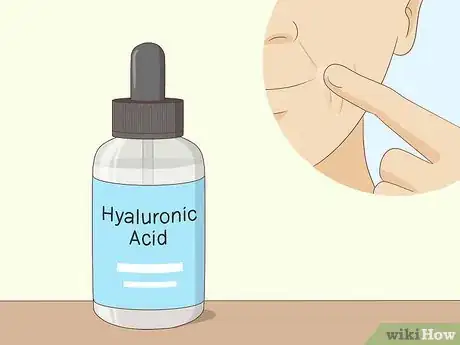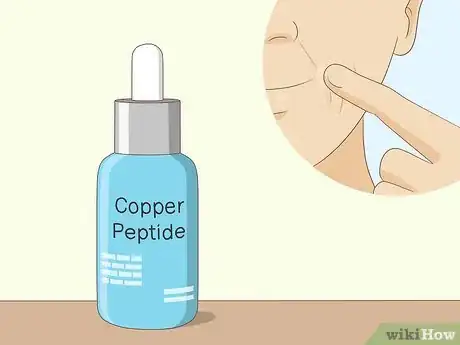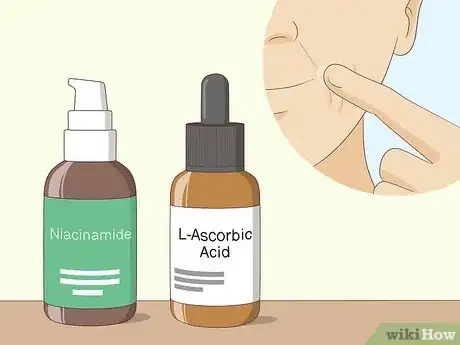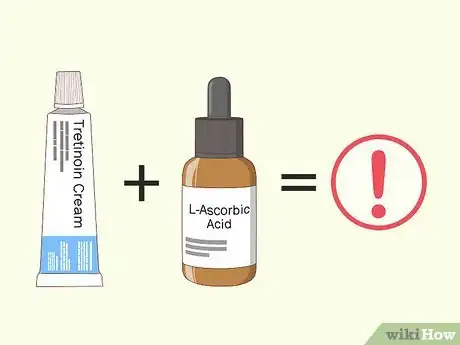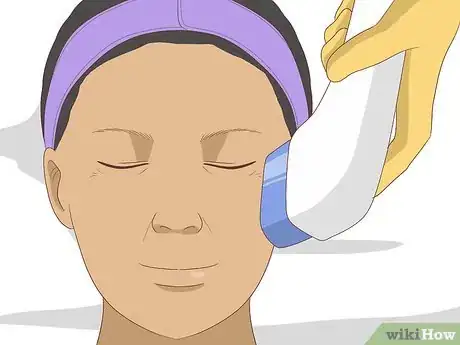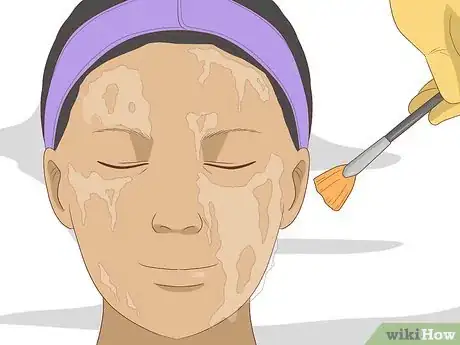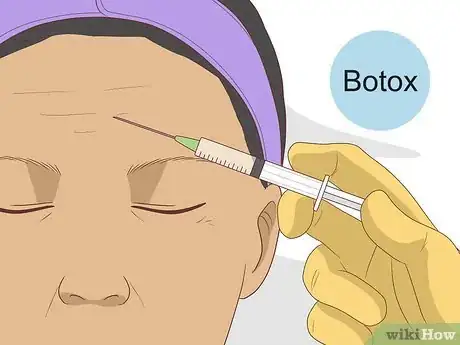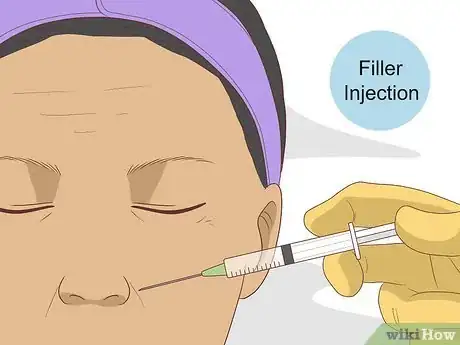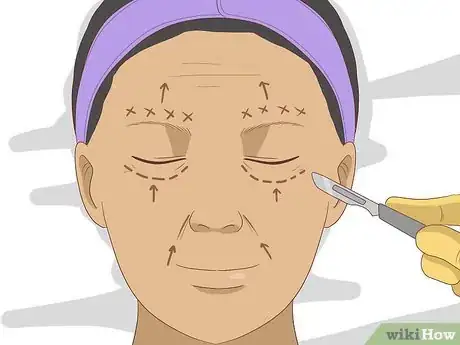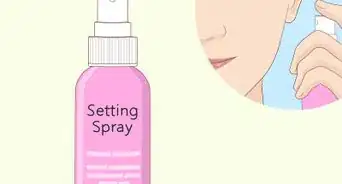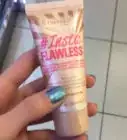This article was co-authored by David Isaacs, MD and by wikiHow staff writer, Amy Bobinger. Dr. David Isaacs is a Board Certified and Dual-Fellowship trained Oculofacial Plastic and Reconstructive surgeon in Beverly Hills, California. Dr. Isaacs treats aesthetic and functional conditions of the face and eyelids, as well as revision surgery and aesthetic reconstruction. He graduated with Honors from both the University of California, Los Angeles (UCLA) and the Chicago Medical School. Dr. Isaacs completed a General Surgery internship at Cedars-Sinai Medical Center and an Ophthalmology residency at New York Med, where he also served as Chief Resident. Dr. Isaacs returned to UCLA for a fellowship in Oculofacial Plastic and Reconstructive Surgery & Orbital Surgery. Dr. Isaacs then completed a second fellowship in Facial Cosmetic, Plastic, and Reconstructive Surgery through his UCLA fellowship. Dr. Isaacs is one of the few surgeons in the United States to complete both fellowships, be double board certified, be a member of the American Society of Oculofacial Plastic Surgery (ASOPRS), and be a member of the American Academy of Facial Plastic and Reconstructive Surgery (AAFPRS).
There are 21 references cited in this article, which can be found at the bottom of the page.
wikiHow marks an article as reader-approved once it receives enough positive feedback. This article received 12 testimonials and 93% of readers who voted found it helpful, earning it our reader-approved status.
This article has been viewed 1,398,982 times.
Rocking a more mature look has never been cooler, but don't feel bad if you have deep wrinkles that bother you. You can still embrace your age while taking steps to look as young as you feel! While home remedies won't make much of a difference to deep wrinkles, there are commercial and professional treatments that can help. Cosmetic creams are relatively inexpensive and there are some active ingredients that show promise at improving the appearance of wrinkles. However, since they're not FDA-regulated, there's no way to guarantee their effectiveness. If the wrinkles really affect your confidence, consider talking to a dermatologist about cosmetic procedures that can help.
Steps
Skincare Products
-
1Apply an anti-aging gel, cream, or serum every day. There's an endless array of skincare products on the market, and each has a unique formulation and combination of active ingredients. Regardless of which product you choose, you'll get the best results if you apply it consistently, so be sure to incorporate your anti-aging products into your daily skincare routine.
- Anti-aging creams are typically thick, and they're especially effective at nourishing dry skin.[1]
- Gels are lighter than creams and they often have a silky feel. They absorb into the skin more quickly than creams, so they're a good option if you want to incorporate your anti-aging products into your morning routine.
- Serums tend to have a high concentration of the active ingredient, and they're good at penetrating deep into your skin. You may still want to use a cream or gel moisturizer after your anti-aging serum if your skin feels dry, but just use a plain moisturizer without anti-aging ingredients.[2]
-
2Use topical retinoids for a powerful option. Retinoids, which are derived from vitamin A, are some of the most popular anti-wrinkle ingredients in skincare. You can find both natural and synthetic retinoids in over-the-counter strength creams, or you can ask your dermatologist about a prescription-strength retinoid like tretinoin.[3] If you use retinoic acids consistently over a period of time, you may notice the lines on your face starting to fade.[4]
- Retinoids can make it easier for you to get a sunburn, so be especially sure to put on SPF every day if you're using them.
- You may also notice mild side effects like dry skin, itching, redness, or burning, which may go away after a few weeks.https://www.self.com/story/retinization-period However, if they persist, try using a different formula, like a moisturizer containing retinol or retinaldehyde, which tend to be less irritating.[5]
- The results from retinoids can take a while to show up. It might be 3-6 months before you start to see an improvement in your wrinkles, and you should see the best results after about 6-12 months.[6]
Advertisement -
3Smooth your skin with alpha hydroxy acids. Alpha hydroxy acids (AHAs), like glycolic and lactic acid, and beta hydroxy acids (BHAs), like salicylic acid, gently exfoliate your skin. In addition, they might have a slight plumping effect, which can decrease the appearance of wrinkles and lines.[7]
- You can often find these ingredients in chemical exfoliants. Start by only applying them once a week or so, since they might make your skin extra sensitive.
- Your skin will likely look more smooth and plump right away, although the effects may only be temporary. However, you may notice an improvement in your wrinkles over time, especially if you use an AHA.[8]
-
4Try a silicone-based wrinkle filler for instant results. A wrinkle filler works by actually filling in the wrinkles on your face, creating a smooth appearance. Just tap or smooth it into place and wait for it to dry according to the label instructions. The effects will be gone once you wash your face, but you should see results right away, so this is a good option if you just want to look fresh-faced in a hurry.[9]
- You can apply makeup right over the wrinkle filler, if you'd like—the silicone will work as a primer.
- Although most wrinkle fillers won't have any long-term effects on your skin, some do contain exfoliants that can gradually help smooth out your wrinkles.
- These are typically marketed as wrinkle fillers, although you may get a similar effect by using a silicone-based makeup primer.
-
5Opt for hyaluronic acid to help plump your skin. Hyaluronic acid is a naturally-occurring active ingredient found in many hydrating anti-aging products. It attracts water and holds it in your skin. That extra hydration will plump up your skin, smoothing out the appearance of wrinkles.[10]
- Since hyaluronic acid plumps your skin, you should see some improvement in your wrinkles right away.[11] Since your skin will look plump and smooth, you may notice that new wrinkles don't form as easily, as well.
- It's especially helpful at improving the look of crepey wrinkles.
-
6Look for peptides to boost collagen over time. Some wrinkle creams contain peptides, which help encourage your skin to produce collagen. With regular use, this can help lessen the appearance of lines and wrinkles on your face.[12]
- Copper peptides are commonly used in anti-aging products.
-
7Check for antioxidants like niacinamide and L-ascorbic acid. Antioxidants help protect your skin from free radicals that can damage it and cause wrinkles. With regular use, they might also help reduce lines and wrinkles that are already there, although it may take a while to see noticeable results.[13]
- Niacinamide is a popular antioxidant that helps hydrate your skin, improving its elasticity.
- Vitamin C is another popular antioxidant, but it's only really effective in skincare if it comes in the form of L-ascorbic acid.[14]
- Coenzyme Q10 (CoQ10) is an enzyme that's naturally found in your body. It can help improve lines and wrinkles, and it also works as an antioxidant.[15]
- Aloe vera contains antioxidant-rich vitamins, along with skin-friendly enzymes, minerals, fatty acids, and more.[16] It's a common ingredient in skincare products, although you can actually use aloe vera gel on its own if you prefer a more natural moisturizer.
-
8Use caution when you combine ingredients. When you're trying out new skincare products, it's usually best to introduce one new ingredient at a time.[17] That way, you can be sure you won't have a bad reaction to it, and if you do, it will be easy to know what to eliminate. In addition, be especially mindful not to combine multiple acid-based products on your skin, as that can increase your risk of skin irritation.[18]
- For instance, you probably shouldn't add new products containing retinol and L-ascorbic acid at the same time.
- Similarly, avoid using an exfoliating scrub with a product that contains chemical exfoliants like AHAs or BHAs.
- If you have any dermatological procedures done to help reduce your wrinkles, talk to your doctor about what products and ingredients are safe for you to use.
Dermatological Procedures
-
1Try laser surfacing to help smooth and tighten your skin. In laser resurfacing, you'll be treated with a laser that gently removes the top layer of your skin. As you heal, your new skin will look smoother and tighter, and you may notice your wrinkles are diminished.[19]
- It might take several months before your skin is completely healed, so be sure to carefully follow any aftercare instructions.
- Typically, you'll receive a local anesthetic before this procedure is done, but if you're having a larger area resurfaced, you might be fully sedated.
- Some people experience scarring or permanent skin darkening after laser surfacing. Your risk of this may be higher if you have a darker skin tone.[20]
-
2Smooth out wrinkles with a chemical peel. A chemical peel is like a stronger version of chemical exfoliation. Your doctor will apply a solution to your skin that will gently dissolve the top layers, which should result in a decreased appearance of wrinkles.[21]
- To remove deep wrinkles, your doctor will likely recommend a peel that penetrates the middle or deepest layers of your skin. These take longer to heal, but the results will be more effective than a gentler peel, and you may not need to return for any additional sessions.[22]
- It's common for your skin to be red or sensitive after a chemical peel. If you have a deep peel, you might notice that your skin is lighter than normal, especially if you have a darker skin tone. More rarely, you may experience scarring, skin discoloration, or skin infection.[23]
-
3Freeze your wrinkles with Botox. Even though Botox is derived from the botulinum toxin, it's FDA-approved for use as an injectable wrinkle treatment. The toxin paralyzes the muscles around the injection site, so they aren't able to wrinkle naturally. In addition to the visible effects you'll get during the 3-4 months the Botox is active, your wrinkles might actually start to go away in the long run.[24]
- Botox is especially effective when it's used to treat wrinkles around the eyes and in the center of the forehead.
- Botox should only be administered by a licensed medical professional.
- In addition to the visible effects you'll get during the 3-4 months the Botox is active, your wrinkles might actually start to go away in the long run. That's because most wrinkles are caused by repetitive movements. When those muscles can't move, the lines caused by that movement will start to fade.[25]
- Some people experience a drooping eyelid after a Botox injection. Fortunately, this should go away after a few days.[26]
-
4Get injectable fillers for a longer-lasting boost. Most fillers will be absorbed into your body eventually, but they can give you a smooth appearance while they last—usually about 4-6 months. Fillers can be made of fat, collagen, or hyaluronic acid. When they're injected beneath your skin, they'll plump up your face, smoothing out deep creases like laugh lines around your mouth and nose.[27]
- You might notice tenderness, redness, bruising, or swelling after an injection.[28]
- See a licensed esthetician for fillers—you should never try to do an injection yourself at home.
-
5Opt for a face lift for the most dramatic results. When you get a face lift, a surgeon will go in and carefully tighten the muscles and tissues under your skin. They may also remove excess skin from your face. This is an expensive procedure with a long recovery time, but the results can be dramatic.[29]
- You might have swelling and bruising for several weeks after a face lift. Depending on the procedure, some scarring might be permanent.
- Typically, the results will last for about 7-10 years.[30]
How Can I Increase Collagen Production In My Face?
Expert Q&A
Did you know you can get expert answers for this article?
Unlock expert answers by supporting wikiHow
-
QuestionHow do you remove eye bags?
 Marsha Durkin, RNMarsha Durkin is a Registered Nurse and Laboratory Information Specialist for Mercy Hospital and Medical Center in Illinois. She received her Associates Degree in Nursing from Olney Central College in 1987.
Marsha Durkin, RNMarsha Durkin is a Registered Nurse and Laboratory Information Specialist for Mercy Hospital and Medical Center in Illinois. She received her Associates Degree in Nursing from Olney Central College in 1987.
Registered Nurse
-
QuestionWhat's the best sunscreen to use for your face?
 Marsha Durkin, RNMarsha Durkin is a Registered Nurse and Laboratory Information Specialist for Mercy Hospital and Medical Center in Illinois. She received her Associates Degree in Nursing from Olney Central College in 1987.
Marsha Durkin, RNMarsha Durkin is a Registered Nurse and Laboratory Information Specialist for Mercy Hospital and Medical Center in Illinois. She received her Associates Degree in Nursing from Olney Central College in 1987.
Registered Nurse
-
QuestionWhat is the best treatment for deep wrinkles on the face?
 David Isaacs, MDDr. David Isaacs is a Board Certified and Dual-Fellowship trained Oculofacial Plastic and Reconstructive surgeon in Beverly Hills, California. Dr. Isaacs treats aesthetic and functional conditions of the face and eyelids, as well as revision surgery and aesthetic reconstruction. He graduated with Honors from both the University of California, Los Angeles (UCLA) and the Chicago Medical School. Dr. Isaacs completed a General Surgery internship at Cedars-Sinai Medical Center and an Ophthalmology residency at New York Med, where he also served as Chief Resident. Dr. Isaacs returned to UCLA for a fellowship in Oculofacial Plastic and Reconstructive Surgery & Orbital Surgery. Dr. Isaacs then completed a second fellowship in Facial Cosmetic, Plastic, and Reconstructive Surgery through his UCLA fellowship. Dr. Isaacs is one of the few surgeons in the United States to complete both fellowships, be double board certified, be a member of the American Society of Oculofacial Plastic Surgery (ASOPRS), and be a member of the American Academy of Facial Plastic and Reconstructive Surgery (AAFPRS).
David Isaacs, MDDr. David Isaacs is a Board Certified and Dual-Fellowship trained Oculofacial Plastic and Reconstructive surgeon in Beverly Hills, California. Dr. Isaacs treats aesthetic and functional conditions of the face and eyelids, as well as revision surgery and aesthetic reconstruction. He graduated with Honors from both the University of California, Los Angeles (UCLA) and the Chicago Medical School. Dr. Isaacs completed a General Surgery internship at Cedars-Sinai Medical Center and an Ophthalmology residency at New York Med, where he also served as Chief Resident. Dr. Isaacs returned to UCLA for a fellowship in Oculofacial Plastic and Reconstructive Surgery & Orbital Surgery. Dr. Isaacs then completed a second fellowship in Facial Cosmetic, Plastic, and Reconstructive Surgery through his UCLA fellowship. Dr. Isaacs is one of the few surgeons in the United States to complete both fellowships, be double board certified, be a member of the American Society of Oculofacial Plastic Surgery (ASOPRS), and be a member of the American Academy of Facial Plastic and Reconstructive Surgery (AAFPRS).
Facial Cosmetic Specialist
Warnings
- Avoid exfoliating if you use another exfoliating product or anything that makes your skin more sensitive, like retinol.[32]⧼thumbs_response⧽
References
- ↑ https://www.paulaschoice.com/expert-advice/skincare-advice/eye-care/eye-creams-vs-eye-gels-which-should-you-use.html
- ↑ https://www.today.com/style/what-serum-everything-know-about-face-serum-t149981
- ↑ https://www.mayoclinic.org/diseases-conditions/wrinkles/diagnosis-treatment/drc-20354931
- ↑ David Isaacs, MD. Board Certified Oculofacial Plastic & Reconstructive Surgeon. Expert Interview. 22 July 2020.
- ↑ https://www.ncbi.nlm.nih.gov/pmc/articles/PMC2699641/
- ↑ https://www.health.harvard.edu/staying-healthy/do-retinoids-really-reduce-wrinkles
- ↑ https://health.clevelandclinic.org/whats-causing-your-crepey-skin-and-how-can-you-fix-it/
- ↑ https://ncbi.nlm.nih.gov/pmc/articles/PMC3941867/
- ↑ https://www.chicagotribune.com/consumer-reviews/sns-bestreviews-beauty-the-best-wrinkle-filler-20190912-story.html
- ↑ https://health.clevelandclinic.org/whats-causing-your-crepey-skin-and-how-can-you-fix-it/
- ↑ https://www.ncbi.nlm.nih.gov/pmc/articles/PMC2699641/
- ↑ https://www.mayoclinic.org/diseases-conditions/wrinkles/in-depth/wrinkle-creams/art-20047463
- ↑ https://www.mayoclinic.org/diseases-conditions/wrinkles/in-depth/wrinkle-creams/art-20047463
- ↑ https://my.clevelandclinic.org/health/articles/10980-understanding-the-ingredients-in-skin-care-products
- ↑ https://pubmed.ncbi.nlm.nih.gov/26648450/
- ↑ https://www.ncbi.nlm.nih.gov/pmc/articles/PMC2763764/
- ↑ https://www.paulaschoice.com/expert-advice/skincare-advice/basic-skin-care-tips/stopping-unwanted-reactions-to-skincare-products.html
- ↑ https://www.health.harvard.edu/blog/skin-serum-what-it-can-and-cant-do-2018061214029
- ↑ https://www.mayoclinic.org/diseases-conditions/wrinkles/diagnosis-treatment/drc-20354931
- ↑ https://my.clevelandclinic.org/health/articles/10984-wrinkles
- ↑ https://www.mayoclinic.org/diseases-conditions/wrinkles/diagnosis-treatment/drc-20354931
- ↑ https://www.mayoclinic.org/tests-procedures/chemical-peel/about/pac-20393473
- ↑ https://www.mayoclinic.org/tests-procedures/chemical-peel/about/pac-20393473
- ↑ https://www.mayoclinic.org/diseases-conditions/wrinkles/diagnosis-treatment/drc-20354931
- ↑ David Isaacs, MD. Board Certified Oculofacial Plastic & Reconstructive Surgeon. Expert Interview. 22 July 2020.
- ↑ https://my.clevelandclinic.org/health/articles/10984-wrinkles
- ↑ https://my.clevelandclinic.org/health/articles/10984-wrinkles
- ↑ https://www.mayoclinic.org/diseases-conditions/wrinkles/diagnosis-treatment/drc-20354931
- ↑ https://www.mayoclinic.org/diseases-conditions/wrinkles/diagnosis-treatment/drc-20354931
- ↑ https://my.clevelandclinic.org/health/articles/10984-wrinkles
- ↑ https://www.aad.org/public/everyday-care/skin-care-secrets/anti-aging/reduce-premature-aging-skin
- ↑ https://www.aad.org/public/everyday-care/skin-care-secrets/anti-aging/reduce-premature-aging-skin
About This Article
While it’s not really possible to remove deep facial wrinkles, you can reduce their appearance by using a moisturizer with ingredients like retinoids and idebenone, which have been proven to reduce lines and wrinkles. Additionally, wash your face no more than twice a day, since over-washing can remove your skin’s natural oils and make wrinkles look deeper. You can also try a glycolic acid peel or a peel with salicylic acid to reduce the intensity of wrinkles, or consider laser resurfacing for particularly deep wrinkles that don’t respond to other treatments. For more advice from our Medical reviewer, like how to reduce the appearance of wrinkles by making healthy lifestyle changes, read on!
